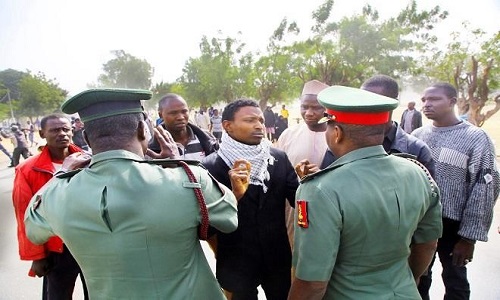 The Kaduna State Government has named Justice Mohammed Lawal Garba of the Federal Court of Appeal, Port Harcourt as Chairman of a judicial commission of inquiry into the December 12-14 clash between soldiers and the Islamic Movement in Nigeria in Zaria, Kaduna State.
The Kaduna State Government has named Justice Mohammed Lawal Garba of the Federal Court of Appeal, Port Harcourt as Chairman of a judicial commission of inquiry into the December 12-14 clash between soldiers and the Islamic Movement in Nigeria in Zaria, Kaduna State.
The clash, which arose when some youths of the Islamic Movement in Nigeria blocked the convoy of the Chief of Army Staff, Lt.-Gen. Tukur Buratai, from using the road in front of their spiritual headquarters in Zaria, an act the Nigerian Army alleged was an assassination attempt, led to the death of scores of the Shi’a sect.
The movement’s leader, Sheik Ibraheem El-Zakzaky and his wife, who received gunshot wounds, are said to be recuperating at an undisclosed location in Abuja even as several members of the group are in detention facilities in Kaduna.
The Kaduna State Government, which said the judicial commission of inquiry was of utmost importance to the public interest, listed other members of the panel as: Prof. Salihu Shehu, a lecturer at Bayero University, Kano; Prof. Umar Labdo of the Faculty of Humanities, Northwest University, Kano; Malam Salihu Abubakar, a former director of the National Agricultural Extension and Research Liaison Services (NAERLS); Ahmadu Bello University, Zaria; Prof. Auwalu Yadudu, Law teacher and Special Adviser on Legal Matters to the late head of state, General Sani Abacha and Prof. Ibrahim Gambari, one-time minister of Foreign Affairs and former Under-Secretary-General of the United Nations.
Also to serve on the panel are: Afakriya Gadzama , a former Director-General of the Department of State Services (DSS); Brigadier-General Aminun-Kano Maude (rtd), former Deputy Director, Army Finance and Accounts; Dr Jibrin Ibrahim, academic, civil society leader and columnist; Mrs. Khadijah Gambo, gender rights activist and conflict resolution expert; Bilya Bala, banker, management consultant and journalist; Major-General Alexander Anjili Mshelbwala(rtd), a one-time Military Secretary of the Nigerian Army; Mrs. Desire Nsirim, retired police commissioner and Dr Bala Babaji, Director of the Centre for Islamic Legal Studies, Institute of Administration of the Ahmadu Bello University, who will serve as secretary of the panel.
In a statement on Saturday by his media aide, Samuel Aruwan, Governor Nasir El-Rufai said that the commission of inquiry will submit its final report six weeks after its first public sitting.
The panel will determine the immediate causes of the clashes; examine the historical circumstances and contributory factors of the clashes and to ascertain the number of persons killed, wounded or missing during the clashes.
It will also identify the actions of persons, institutions, federal and state actors and determine whether such actions were necessary, appropriate and sufficient in the circumstances in which they occurred.
The statement said: “In a statewide broadcast last month, Governor El-Rufai had promised to establish a judicial commission of inquiry into the Zaria clashes as a matter of utmost importance to the public interest.
“Since the unfortunate incident, the Kaduna State Government has been discharging its obligations to promote the public welfare.
“There was no reason at any point to put governance in abeyance or to abdicate the responsibility of the government to enforce the law and uphold security.
“Neither was it necessary for the Kaduna State Government to speak and act as if it was not in possession of any facts relevant to the matter.
“Government has to acknowledge as much when a building has been put up without evidence of title or the necessary planning approvals; and the state has to initiate prosecutions when valid laws have been broken.
“It is not in the public interest for government to decline its duty. The members of the Judicial Commission of Inquiry into the Zaria clashes were chosen for their professional competences as lawyers, jurists, scholars of religion, human rights activists, security experts and media practitioners”.
The judicial commission of inquiry will be inaugurated later this week.




